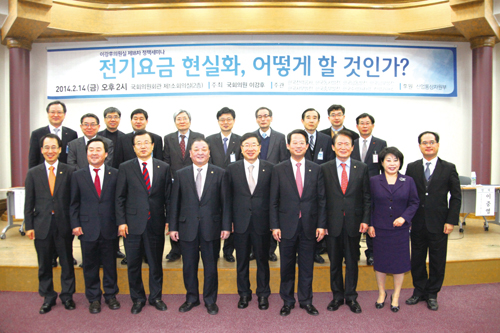Rep. Lee Kang-hoo hosts a seminar on how to rationalize electricity charges

_이강후의원_전기02jpg40.jpg)
(right photo) Rep. Lee Kang-hoo of the National Assembly Trade,
Industry and Energy Committee, speaks at a policy seminar on
how to rationalize a system for determining electricity charges
at the National Assembly Parliamentarians’ Hall on Feb. 14.
The participants of the event pose for a group photo.
Electricity charges are forecasted to go up sooner or later.
Rep. Lee Kang-hoo of the National Assembly Trade, Industry and Energy Committee hosted a policy seminar on how to rationalize a system for determining electricity charges at the National Assembly Parliamentarians’ Hall on Feb. 14.
Lee Jung-young, head of KEPCO’s Pricing System Office, said the renewable energy portfolio standard (R PS), which went into effect in 2012, and other institutional measures to be introduced during this year and next year, are likely to push up electricity charges. Lee cited as the upcoming cost-push factors the restructuring of energy taxes, introduction of an emission trading system, RPS and the enforcement of the Act on Compensating and Supporting the Neigh- borhood Areas of Power Transmission and Transformation Facility Sites, changes in power trading systems, and reinforced steps to ensure nuclear safety.
Among the roughly 200 participants of the seminar organized by KEPCO and six power companies as well as the Korea Power Exchange were Chairman Kang Chang-il of the National Assembly Trade, Industry and Energy Committee and representatives from the power industry and academic circles.
Rep. Lee said in his opening speech, “Rationalizing a system for determining electricity is a major energy policy task to be carried out from a long-term perspective, but the problem is that the government’s decisions to raise electricity charges three times during last year should have been fully explained to the people.”
The event served as an opportunity to take a look at the 2nd energy master plan, finalized by the Ministry of Trade, Industry and Energy (MOTIE), KEPCO’s 2013 business performance, and upcoming additional factors that are expected to push up electricity charges.
Committee Chairman Kang said in his commemorative speech that current relative prices among energy sources have been extremely distorted, so energy prices need to be rationalized. He went on to say that unit costs have risen according to international price fluctuations of such primary energy sources as crude oil and anthracite coal, but prices of electricity, the secondary energy, have been increasing to minimum levels in order to stem general price increases, that is to say inflation. The distortion of the relative prices of various energy sources has led to creating a vicious cycle of an increase in substation costs for electricity, a surge in electricity demand, and a consistent rise in energy imports. A normalization of energy prices would lead to the normalization of relatives prices of electricity and non-electricity energy sources, thus prodding investments into energy consumption efficiency and preventing the transfer of the financial burden for future generations caused by lower electricity charges and coping with the limitations of energy-supply policies, Kang noted.
Starting July 1 anthracite coal will be one of the items on which a special consumption tax is imposed in line with the restructuring of taxes designed to prevent overconsumption of electricity. Power companies will be levied 24 won per kg. of coal in the special consumption tax, but initially a flexible special consumption tax will be 28 won per kg. of coal. The tax will account for some 18 percent to 20 percent of coal prices, compared to 6 percent for LNG, thus leading to a rise in electricity charges.
